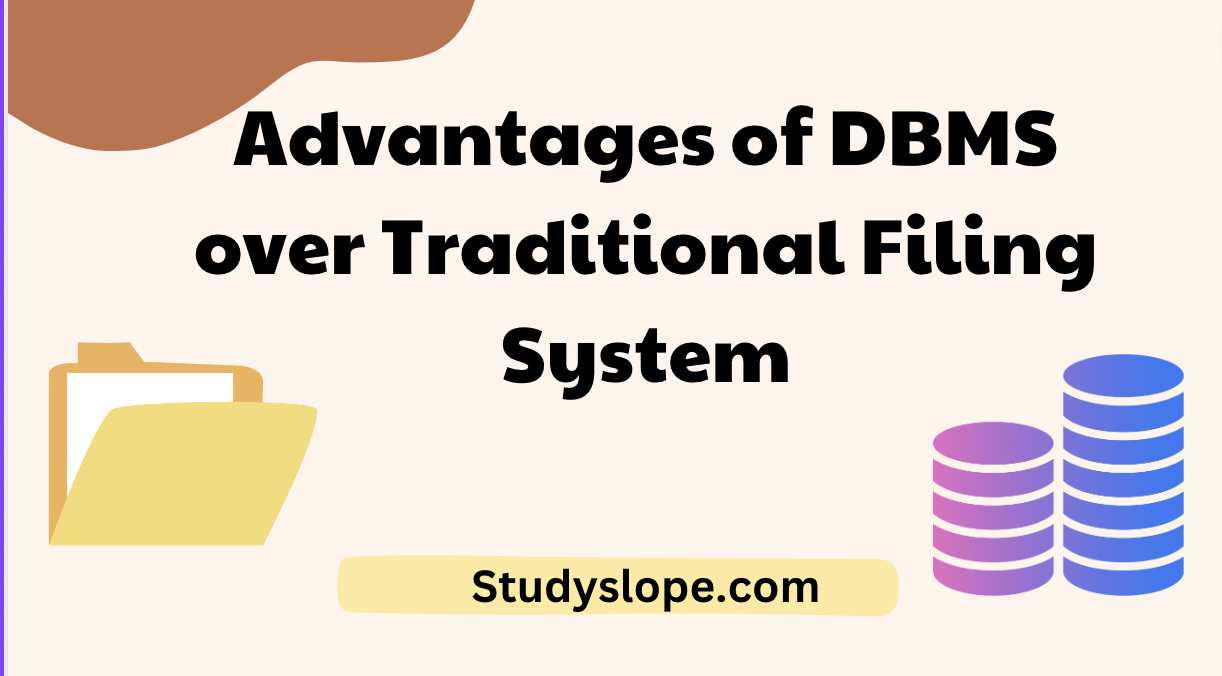Advantages of DBMS over Traditional Filing System
File System: A DBMS that permits access to a single file or table at a time is referred to as a file management system. Data is directly stored in a collection of files in a file system. It contains flat files that are independent of one another (a flat file is a file that only stores one table; hence, the name).
DBMS:A database management system (DBMS) is a piece of application software that enables users to establish, develop, maintain, and exchange databases in an effective manner. Data types, structures, and constraints for the data to be stored in a database must be specified in order to define the database. Data must be kept on a storage medium under the control of a database management system (DBMS) in order to create a database. A database needs to be updated periodically to reflect changes in the real world and to keep up with technological advancements. Reports must also be generated for each update. Permitting many people to access a database is known as sharing. The DBMS also acts as a conduit between the database and users or programmes used for application.
By putting rules on the data, it grants controlled access to the data and guarantees that the data is accurate and consistent.
By submitting queries or data requests to the DBMS, an application programme can access the database. Data from the database is retrieved in response to a query.
Advantages of DBMS over Traditional Filing System
There are several advantages of DBMS over Traditional Filing System which we are going to see in this articles.
Data Integrity: By blocking unauthorised changes and maintaining referential integrity, DBMS enforces data integrity constraints, ensuring accurate and consistent data.
Data Centralisation: DBMS centralises data storage, decreasing data redundancy and enhancing data consistency throughout the organisation.
Data Security: To safeguard sensitive information from unauthorised access, DBMS provides robust security methods such as user identification, authorisation, and encryption.
Data Access and Retrieval: DBMS provides query languages that enable complicated data retrieval and analysis, hence boosting data accessibility and decision-making.
Data Sharing: DBMS lets several people to view data at the same time, facilitating cooperation and reducing data duplication.
Data Maintenance: A database management system (DBMS) facilitates data maintenance duties such as adding, updating, and removing entries, maintaining data accuracy and decreasing data entry errors.
Backup and recovery: DBMS provides automated backup and recovery processes, which improve data reliability and reduce the risk of data loss.
Scalability: DBMS systems may accommodate increasing data volumes and user numbers by scaling up hardware resources without requiring large changes to the application.
Data Redundancy is Reduced: DBMS reduces data duplication, resulting in more efficient storage utilisation and greater data consistency.
Data Concurrency: A database management system (DBMS) manages concurrent data access by different users, ensuring data consistency and avoiding disputes.
Data Modelling: DBMS enables data modelling techniques such as ER diagrams, which aid in the creation and comprehension of complicated data relationships.
Data Independence: Because DBMS separates data storage and application logic, it provides data independence and allows changes to the database structure to be made without affecting applications.
The above mentioned points gives clear idea about the advantages of of DBMS over Traditional Filing System. Overall, DBMS provides improved data management, security, efficiency, and flexibility as compared to traditional filing systems.
People Also Viewed: What are database anomalies? Discuss briefly with an example.

